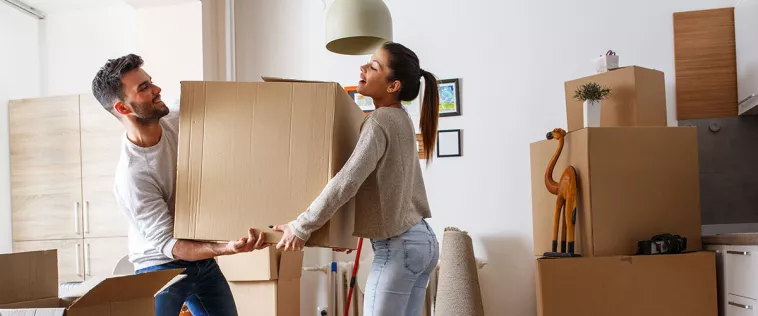
10 Moving Budget Tips to Save Money (and Your Sanity)
Moving to a new home is a fresh start — but when you add up security deposits, truck rentals, gas, and supplies, costs can quickly drain your wallet.
With a smart plan, you can keep costs manageable, reduce stress, and focus on settling into your new place.
Money-saving tips for moving on a budget
When you’re moving to a new home, it pays to know how to make your move as efficient as possible. While every move presents its own challenges, here are our top 10 tips to moving on a budget:
1. Keep only what you need
As you get ready to move, identify what you want or need to keep. These might be things you use regularly or that have sentimental value. If it’s an item you can go ahead and store, pack it up early.
Consider donating, selling, gifting, or tossing anything you’re not going to keep. The less you take, the easier (and cheaper) your move will be.
2. Sell or donate items you don't want
As you declutter, consider selling unused items that can add some extra cash to your budget. Check with local consignment shops, host a yard sale, or list furniture in neighborhood apps. If something doesn’t sell, donate it to a local charity. Be sure to get a receipt, as your donation may be tax-deductible.
➢RELATED: Turn Clutter in Cash: 5 Decluttering Tips that Pay Off
3. Get quotes from multiple movers
If you plan to use a moving company, compare quotes. There are dozens of moving companies that operate nationwide, and some may have better prices than others.
Here are a few things to consider when hiring a professional mover:
- Don’t wait too long to pick your mover. The earlier you start your search, the wider range of quotes you will get, letting you find the one that best meets your budget.
- Check reviews online and from friends and family. The best way to find a great mover in your area is to use your network of friends and family, but a bit of online research can also offer honest reviews.
- Flat rate vs. hourly. Be cautious of movers that charge by the hour. Obstacles or roadblocks could add to costs beyond your budget. Whenever possible, a flat rate quote from your mover is the safest bet.
4. Create a moving budget
Because of how expensive moving can be, it’s a good idea to create a “moving budget.” A few costs to keep in mind include:
- Closing out your utilities (gas, electricity, and cable) and opening accounts at your new address.
- Any repairs necessary to retain your security deposit.
- Tipping your movers for a job well done.
- Travel expenses, including gas and food (especially for longer trips).
➢RELATED: Budget Guide: 5 Steps to Create a Budget
5. Start collecting free boxes
One of the ways you can save money on your move is by collecting free boxes. Ask around at local stores and warehouses to see if they have extra boxes they want to get rid of.
If you know a few months in advance you’re going to move, hold on to any delivery boxes you receive.
6. Move during the off-season
When it comes to moving, there’s a definite peak season and off-season. Peak season is typically from April through September, because the weather is nice and families with kids are on summer break.
This means that if you have the option of moving between October and March, take it! You’ll often find that moving companies have better rates because fewer people are using their services.
7. Use DIY packing materials
Get creative with packing material instead of buying it. For example, use towels, stuffed toys, and blankets to cushion glass and fragile objects. Even old newspapers and clothing make excellent packing materials.
8. Move on your own
Handling the move yourself is one of the most budget-friendly options. Renting a truck or PODS container, packing your own boxes, and enlisting a few friends can help you save compared to hiring movers.
It may take more effort, but the savings can be worth it if keeping costs low is your top priority.
9. Be prepared when moving day arrives
If you have a set day and time when your move is supposed to happen, it’s important to stick to it. Moving companies will charge you for delays as well as for any extra work they need to do to help you get ready.
You could also face a fine from your landlord or the person purchasing your home if you don’t move out by the agreed-upon time.
10. Ask friends and family for help
Moving is a big job, but you don’t have to do it alone. Friends and family can make packing and loading faster — and more fun. A simple thank-you, like pizza and drinks, goes a long way in showing your appreciation.
How to create a moving budget
Whether you hire a moving company or do the job yourself, it’s important to create a moving budget. Here’s how to create one and stick to it!
Take inventory📝
As a general rule, the more stuff you take with you on your move, the more expensive the move will be. Moving companies will charge more for the move because there’s more labor involved, and a DIY move will cost more because you’ll need to rent a larger trailer or POD.
Calculate moving costs💵
Once you know what you’re taking with you, you can determine your moving costs. You’ll be able to get accurate quotes from moving companies or decide what size moving truck you need.
Plan for the unexpected⚠️
No matter how much planning you do, there will always be unexpected costs with moving. From flat tires requiring roadside assistance to needing to stay at a motel for a night or two, having an emergency fund in your moving budget is a great idea.
Stick to your budget✅
A budget only helps if you stick to it. Keep all your receipts for moving-related costs and do your best not to overspend as you track your expenses.
➢RELATED: Moving Loans Can Help With Relocation Costs
Avoiding added moving stress
Moving can be a stressful time, especially if you’re not prepared. Here are a few things you can do to lessen the stress for everyone involved:
- Plan out your move ahead of time to avoid last-minute scrambling.
- Pack boxes as early as possible so that you don't have as much to do in the last week or two leading up to your move.
- Create a realistic moving budget.
- Organize and mark your boxes so you know where everything is.
- Get help from friends and family members or hire a moving company.
- ave someone pet sit and/or babysit so you can focus on getting things done.
💡Tip: Pack a “Day One box” with bedding, towels, toilet paper, a coffeemaker and coffee, and an alarm clock. Future-you will thank you when you’re not tearing through boxes at 11:00 pm to find sheets.
While these things may not eliminate moving stress altogether, they'll help you stay organized and make things more manageable on moving day!
MORE MONEY HACKS FOR YOUR HOME:
Notice: Information provided in this article is for informational purposes only. Consult your attorney or financial advisor about your financial circumstances.


